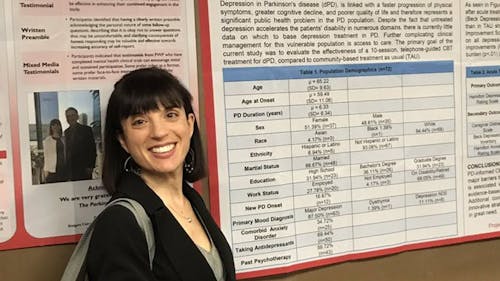Rutgers study finds cognitive behavioral therapy helps those with Parkinson's disease, depression

People with Parkinson’s disease and depression can experience significant relief of depressive symptoms through telephone-based cognitive behavioral therapy (T-CBT), according to a Rutgers study.
CBT is a type of psychotherapy that teaches people to recognize and change negative patterns of thinking and behavior that accompany depression, said lead author Roseanne Dobkin, a professor of psychiatry at Rutgers Robert Wood Johnson Medical School. Depression affects up to 50 percent of people with Parkinson’s disease, she said.
Depression is especially common for people with Parkinson’s disease because it causes degenerative changes in the brain that can directly contribute to depression and anxiety, Dobkin said. Managing the illness, which involves unpredictable symptom fluctuations and new losses and limitations, is also a major source of chronic stress.
“Even for people who don’t have Parkinson’s, depression and anxiety make it much harder to manage daily stressors, which would include managing any chronic illness,” Dobkin said. “Depression and anxiety can also compromise people’s attention, planning and problem-solving capabilities — skills that are also often affected by Parkinson’s. This becomes especially problematic because managing Parkinson’s requires juggling a lot of complex demands on these skills, like following a precisely timed medication regimen, engaging in multiple therapies (e.g., speech, physical and occupational) and exercising regularly, all while responding to unpredictable (Parkinson’s disease) symptoms that can disrupt plans and limit valued activities.”
She said the demands of Parkinson’s disease combined with coping difficulties from Parkinson’s disease and depression can make it much harder for the afflicted to fend off negative emotions and stay engaged in what matters most to them, but data suggests only approximately 40 percent of them receive treatment for depression.
People with Parkinson's disease often face long distances to centers with Parkinson’s disease-informed depression care and physical disabilities that make attending frequent appointments more challenging, Dobkin said. There are also currently very few clinicians trained to provide effective, evidence-based treatment for depression with Parkinson's disease.
After seeing favorable results for in-person CBT treatment of depression in Parkinson’s disease patients in a separate study, testing whether T-CBT could produce the same results was a natural next step, Dobkin said.
“Our findings show that CBT, tailored to address coping challenges in Parkinson’s disease, can be just as effective for people who get treatment by telephone,” she said. “This option can make CBT much more accessible to people who, for any of the reasons mentioned above, can’t attend weekly psychotherapy appointments with a specialist clinician in person.”
Seventy-two people diagnosed with Parkinson’s disease and depression were recruited for the study. Half of the participants with Parkinson's disease participated in weekly 1-hour CBT sessions by phone alongside their usual medical and mental healthcare for three months, with the option to continue the sessions for six months up to once a month. The remaining participants received only their usual care.
The sessions had participants reframe distorted, negative thoughts to more realistically describe their situation, set daily goals for social activity, exercise and other valued activities and train in relaxation skills and sleep hygiene, Dobkin said.
The group that participated in T-CBT showed a marked improvement in depressive symptoms overall, while the other group showed no change. The first group maintained their improvement in mood six months after finishing weekly T-CBT sessions.
“These results are exciting because they show that specialized therapy significantly improves depression, anxiety and quality of life in people with Parkinson’s disease and that these results last for at least six months,” Dobkin said. “While these findings need to be confirmed with additional research, they also support the promise of telemedicine to expand the reach of specialized treatment to people who live far from services or have difficulty traveling to appointments for other reasons.”



